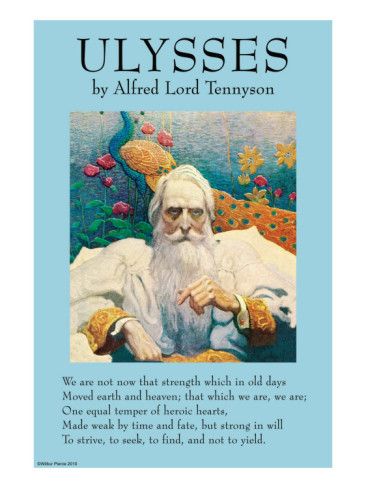Mediocre existence is utter absurdity.
Poet Tennyson made the Greek hero, Ulysses, rage against that sort of existence
in one of his most celebrated poems titled after
the hero himself. Tennyson’s Ulysses is an old man who is quite unhappy
with a life that seems idle to him. He looks around and sees the ordinary
people doing nothing more than eat, mate and hoard. What’s the point of such an
existence? Ulysses thinks of it as “savage” existence.
Ulysses wants
to live life to its fullest. “I will drink / Life to the lees” is what he says.
His heart is hungry for more, more than what satisfies the ‘savage’ man. Ruling
a country of ‘savages’ is not his work, Ulysses thinks. His son who possesses a
different spirit of “slow prudence” can do the job of subduing a savage people “to
the useful and the good.” His own mission is “to strive, to seek, to find, and
not to yield.”
Tennyson’s
Ulysses is an eternal seeker. To be fully human and fully alive is his dream.
Life never gives us fully satisfactory answers at any time. Go on searching for
more and more answers. That is what Ulysses is suggesting. “Much have I seen
and known,” he says. But that is not enough. There is a lot more to be seen and
learnt “from that eternal silence.”
“To follow
knowledge like a sinking star” is Ulysses’ aspiration. This sets him apart from
most people and he knows that. He cannot be a king because of that difference.
Being a king, exercising power over “rugged people,” is not the job of the
seeker of truths. Truth and political power have little in common. To seek the
truth is to strive with Gods. To be a king is to struggle with mediocrity. Ulysses
can never tolerate mediocrity. So he sets sail “beyond the sunset.”
Adieu,
Ulysses!
PS. I'm participating in #BlogchatterA2Z
Previous
Post: T for
Taxes
PPS. I am
battling against time these days. Too many irons in the fire. Hence not able to
do justice to the A2Z challenge. But won’t give up.

“Truth and political power have little in common” How true! I wish our politicians, like Ulysses, would decide to strive with the gods rather than struggling with mediocrity which is always the easy and lucrative way out. It would help make a better country!
ReplyDeleteI have encountered ‘Ulysses’ twice today. Maybe it’s a sign from the universe that I need to pick up that long-pending, formidable James Joyce novel.
Good people don't enter politics. That's the problem. As Yeats put it, the best lack the will while the worst are full of passionate intensity.
DeleteNice to get a recap and perhaps a better understanding of the poem I had learnt in high school. It is truly an aspirational poem to be better and better.
ReplyDeleteTennyson was giving expression to the Victorian aspirations.
DeleteStrive ..seek ...find and not yield...not fall for mediocrity..what a grt msg ....i read trojan war but never read Ulysses, but know a bit about this Greek hero...so good that you have summarised his ideology
ReplyDeleteDropping by from a to z "The Pensive"
This is Ulysses as seen by Tennyson. But the message is great, no doubt.
DeleteHari OM
ReplyDeleteI too enjoyed this precis and the vision it contains... YAM xx
U=Ukraine
Happy to hear that.
Delete" Truth and political power have little in common" this is so pertinent in today's India
ReplyDeleteSadly yes.
DeleteSpend my days in
ReplyDeletesearch of food,
Tell petty tales,
Worry myself with thoughts,
Hurt others by my acts,
Turn senile with grey hair
And end up as fodder to the
relentless march of time
as yet another faceless man?
– Subramaniya Bharathi
Living life to the fullest - Different people may have different way of achieving it. It may be like different ways to reach the eternity - attaining a high degree of satisfaction - at the end of their life. Though it is hard to accept, we continue being trivial, mediocre and stereotyped. Because it is easier! Thank you for another interesting post.
After a lifetime of adventure, Ulysses looks back on his life, unhappy about how it has turned mediocre. This is such a different take from that of Homer's. There are many people who feel that way after retirement as well, especially those who have been in high places!
ReplyDelete